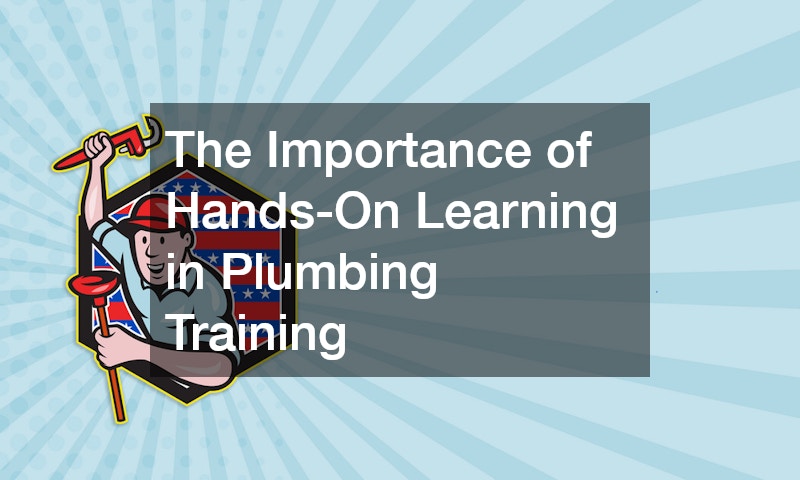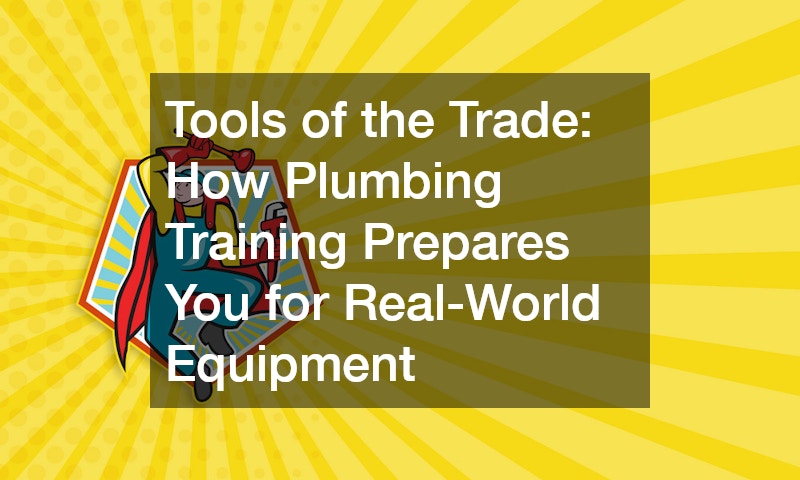
Plumbing training is an essential foundation for anyone aspiring to become a skilled plumber. This comprehensive training covers both theoretical and practical aspects, ensuring that professionals are well-equipped to tackle a wide range of plumbing challenges. In this article, we will delve into the various components of effective plumbing training, highlighting its importance and how it prepares individuals for successful careers in the plumbing industry.
The demand for skilled plumbers has been on the rise, driven by the need for specialized plumbing services in residential and commercial settings. From installing water lines to conducting sewer camera inspections, plumbers play a critical role in maintaining the infrastructure of modern society. Effective plumbing training fosters the technical skills necessary to meet industry standards and tackle complex plumbing issues.
This article provides an extensive overview of plumbing training, focusing on key areas such as hands-on learning, problem-solving skills, and the integration of technology. By understanding the full scope of plumbing training, aspiring plumbers can gain confidence and competence, leading to successful and fulfilling careers in the trade.
The Importance of Hands-On Learning in Plumbing Training

Hands-on learning is a cornerstone of effective plumbing training. While theoretical knowledge is essential, practical experience allows trainees to apply what they’ve learned in real-world scenarios. This aspect of plumbing training involves working with actual tools and understanding the complexities of plumbing systems firsthand.
Through hands-on learning, students become familiar with essential equipment such as ridgid pipe threaders. This experience equips them to handle various tools competently when they begin working on actual plumbing projects. Furthermore, it allows them to develop confidence in their ability to carry out tasks such as pipe repairs and water line installations.
Hands-on learning also prepares students for emergency plumbing situations. By simulating real-world emergencies during their training, students learn how to think on their feet and solve problems efficiently. This form of education ensures they are ready for the unpredictable nature of plumbing work, which often requires quick and effective responses.
Understanding Plumbing Systems: What You’ll Learn in the Classroom

The classroom component of plumbing training serves as the theoretical foundation upon which practical skills are built. Here, students learn about the various plumbing systems and how they function within building structures. This knowledge is indispensable, as it informs how plumbers approach each task.
During classroom instruction, students explore the specifics of water heater replacements, sewer systems, and other components vital to modern plumbing. This includes understanding the mechanics behind plumbing fixtures and how to troubleshoot common issues. Armed with this knowledge, trainees are better prepared to diagnose problems when they transition to fieldwork.
Classroom learning also emphasizes the principles of water pressure, flow dynamics, and the chemistry of water treatment. Such information is vital for diagnosing issues that may not be visible to the naked eye. By understanding these fundamental concepts, students can make informed decisions in their future roles as plumbing technicians.
Gaining Practical Skills: Transitioning from Theory to Practice
Transitioning from classroom learning to hands-on practice is an integral part of plumbing training. This phase allows students to apply theoretical knowledge to practical situations, reinforcing their understanding of plumbing systems. Trainees engage in exercises such as repiping service procedures, which are critical skills in the plumbing field.
Practical skills training ensures that students can execute complex tasks such as installing plumbing fixtures and conducting comprehensive pipe repairs. This experience is crucial as it directly correlates with the effectiveness and efficiency of a plumbing technician in the field. Moreover, this phase of training helps students to understand the nuances of managing plumbing projects and anticipate potential challenges.
The practice component of training often involves supervised apprenticeships or lab work. In these settings, students gain invaluable experience while receiving feedback from seasoned professionals. This guidance helps them refine their technique and build the confidence necessary for successful outcomes in real-world plumbing jobs.
Tools of the Trade: How Plumbing Training Prepares You for Real-World Equipment

A crucial element of plumbing training is familiarizing students with the tools and equipment they will use in the field. Training programs emphasize the importance of understanding how to operate and maintain equipment like ridgid pipe threaders. Mastery of these tools is essential for tasks ranging from threading pipes to conducting intricate pipe repairs.
Knowledge of equipment extends beyond the technical aspects to include safety considerations. Proper handling and maintenance of plumbing tools are fundamental skills that ensure efficient operation and reduce the risk of accidents. Trainees are taught how to select the right tool for each job, increasing their effectiveness as professionals.
Additionally, understanding the versatility of various plumbing tools prepares students for a range of projects, from routine maintenance to emergency plumbing solutions. This readiness is vital in a profession where the ability to adapt can make a significant difference in job performance and client satisfaction.
Developing Problem-Solving Skills for Plumbing Challenges
Effective plumbing training emphasizes the development of problem-solving skills, which are critical in addressing various plumbing challenges. Students are taught to analyze situations and devise innovative solutions, whether dealing with a simple water line installation or a complex system malfunction. This skill set is crucial, as the nature of plumbing work often requires quick thinking and adaptability.
Training programs simulate real-world plumbing issues, providing students with a practical framework for troubleshooting and repair. Scenarios might include working through malfunctions in plumbing fixtures or diagnosing errors in an emergency plumbing situation. This approach ensures that trainees graduate with the ability to handle unexpected challenges competently.
Beyond technical skills, problem-solving training also focuses on developing soft skills such as communication and teamwork. When a plumbing project requires collaborative effort, the ability to communicate effectively and work proactively with others becomes invaluable. By fostering these attributes, plumbing training prepares individuals for diverse environments and client interactions.
Apprenticeships: The Bridge Between Classroom Learning and Site Experience
Apprenticeships are a vital component of plumbing training, serving as a bridge between classroom learning and on-site experience. These programs expose students to the realities of working in a residential plumbing company or other settings, providing practical experience that complements academic learning. This hands-on approach solidifies the lessons learned in theoretical and lab classes.
Apprentices often work alongside experienced plumbers, allowing them to observe best practices and acquire valuable insights into the profession. Tasks may include working on water heater replacements or conducting sewer camera inspections, experiences that are crucial for a comprehensive understanding of the plumbing industry. This mentorship model encourages skill development and fosters professional growth among apprentices.
Furthermore, apprenticeships offer students the opportunity to develop a network within the industry. Building relationships with experienced plumbers and peers can lead to future job opportunities and career advancement. This networking aspect of apprenticeships is an often-overlooked benefit, but one that can substantially impact a plumber’s career trajectory.
How Plumbing Training Builds Confidence for Fieldwork
One of the primary goals of plumbing training is to build the confidence of students in their ability to perform tasks effectively in the field. Confidence stems from a deep understanding of plumbing systems and the practical experience gained during training. Through hands-on projects and problem-solving exercises, trainees learn to trust their skills and judgment.
Practical exercises, such as managing pipe repairs and emergency plumbing scenarios, provide students with the opportunity to test their abilities under controlled conditions. These experiences are designed to simulate the challenges that plumbers face daily, ensuring that trainees are prepared for real-life situations. By succeeding in these exercises, students build the confidence needed to excel in their careers.
In addition, receiving constructive feedback from instructors and mentors during training bolsters the confidence of aspiring plumbers. This feedback allows students to identify areas for improvement and refine their skills over time. Ultimately, a confident plumber is more likely to deliver high-quality plumbing services and maintain strong client relationships.
Safety First: Learning Best Practices for a Safe Job
Safety is a paramount concern in plumbing training, as the profession involves working with potentially hazardous materials and situations. Training programs prioritize instilling best safety practices in students from the outset. This includes understanding how to handle equipment safely, such as operating ridgid pipe threaders or dealing with live water lines.
Students learn to identify and mitigate potential risks associated with plumbing work. This training is essential, whether conducting routine maintenance or performing more complex tasks like repiping service or emergency plumbing repairs. Knowing how to assess a site’s safety conditions before beginning work is a critical skill that prevents accidents and ensures a safe working environment.
Moreover, plumbing training teaches the importance of adhering to personal protective equipment (PPE) protocols. Proper use of gear such as goggles, gloves, and masks protects plumbers from injuries and exposure to harmful substances. By emphasizing safety best practices, training programs prepare students to conduct their work responsibly and professionally.
Working with Codes and Regulations: What You Need to Know
Understanding plumbing codes and regulations is a crucial aspect of plumbing training. Compliance with local and national codes ensures that all plumbing work meets safety and quality standards. Training programs focus on teaching students about key regulations affecting tasks from installing plumbing fixtures to undertaking comprehensive water heater replacements.
Instructors help students comprehend the complexities of building codes and how they impact plumbing projects. From residential plumbing company standards to commercial requirements, these regulations dictate everything from material choice to installation techniques. By understanding these codes, trainees ensure that their work aligns with best practices and legal standards.
Moreover, mastering the code of ethics is also emphasized in plumbing training. This component encourages students to uphold professionalism and integrity in their work. Knowledge of ethics and regulations instills a sense of responsibility, ensuring that graduates maintain high standards in their professional pursuits.
Building Teamwork Skills: Collaborating with Experienced Plumbers
The ability to work as part of a team is an essential skill developed during plumbing training. Plumbing projects often involve collaboration with experienced plumbers and other tradespeople. Training programs emphasize teamwork through exercises and projects that require coordination and communication.
Students learn the importance of sharing knowledge and techniques with their peers. When working on complex projects like water line installations or sewer camera inspections, effective communication ensures that all team members are aligned and tasks are executed efficiently. This cooperative dynamic results in successful project outcomes and enhanced job satisfaction.
Collaborative training not only improves job site efficiency but also helps students develop interpersonal skills vital for career advancement. By fostering an environment of mutual respect and understanding, plumbing training prepares students to navigate the diverse, dynamic environments they will encounter in their professional lives.
The Role of Technology in Modern Plumbing Training
Technology plays a critical role in modern plumbing training, providing students with advanced tools and resources to enhance their learning experience. From computer simulations to real-time diagnostics tools, technology offers insights into complex plumbing systems. Training programs incorporate these technological advancements to better prepare students for the future of the industry.
One crucial aspect of technology in plumbing training is the use of digital models and simulations. These tools help students visualize plumbing systems, understand their components, and anticipate potential problems. Such technology is especially beneficial for complex tasks like repiping service projects and detailed pipe repairs.
Furthermore, students are introduced to new technological solutions like smart plumbing devices and data-driven diagnostics methods. Familiarity with these tools ensures graduates can provide innovative and efficient plumbing services. By embracing technology, plumbing training programs equip students to navigate and excel in an evolving industry landscape.
How Plumbing Training Teaches Troubleshooting and Problem Resolution
Effective troubleshooting is a fundamental skill taught in plumbing training. Students learn to identify and resolve issues by breaking down complex problems into manageable components. This approach is critical when handling a variety of plumbing challenges, from minor pipe leaks to intricate repiping service operations.
Plumbing training incorporates problem-solving exercises that simulate real-life scenarios, such as misaligned plumbing fixtures or unexpected water heater failures. These exercises teach students to remain calm under pressure and develop strategic solutions. By practicing troubleshooting techniques, trainees enhance their ability to address issues efficiently and effectively.
Moreover, training programs emphasize the use of critical thinking skills to analyze problems and determine the best course of action. This skill set is invaluable, particularly in emergency plumbing situations where quick and accurate responses are necessary. Ultimately, mastering troubleshooting ensures plumbing professionals can offer reliable solutions and maintain client trust.
What to Expect on Your First Job After Completing Plumbing Training
Upon completing plumbing training, graduates can anticipate a range of challenges and opportunities in their first job placements. Initial assignments may include tasks like installing plumbing fixtures, conducting water heater replacements, or performing pipe repairs. These experiences build practical skills and lay the groundwork for a successful career in plumbing services.
New plumbers should expect to continue learning on the job, as real-world challenges can vary significantly from training scenarios. Adapting to the dynamics of a residential plumbing company or other work environments requires both technical knowledge and the ability to navigate interpersonal relationships effectively. Gaining experience through diverse projects hones the skills required for career advancement.
The first job experience often solidifies the foundational knowledge acquired during training and allows graduates to apply their skills confidently. It also provides opportunities to network with experienced professionals who can offer guidance and mentorship. By embracing learning opportunities, new plumbers can transition smoothly from training to successful careers in the industry.
Comprehensive plumbing training is critical for developing the skills and confidence required to excel in the plumbing industry. From hands-on learning experiences to mastering technical knowledge, this training prepares individuals to tackle diverse challenges in both residential and commercial settings. The integration of technology further enhances the ability of trainees to provide innovative and efficient solutions.
Crucial components of plumbing training, such as understanding tools of the trade, developing problem-solving skills, and adhering to safety standards, ensure that graduates are equipped to offer high-quality plumbing services. Additionally, the emphasis on teamwork and compliance with regulations fosters well-rounded professionals capable of thriving in dynamic work environments.
As the industry continues to evolve, plumbing training adapts to integrate new technologies and techniques, ensuring that future generations of plumbers are prepared to meet any challenge. By focusing on comprehensive education and practical experience, plumbing training sets the foundation for lifelong success and fulfillment in this essential trade.
